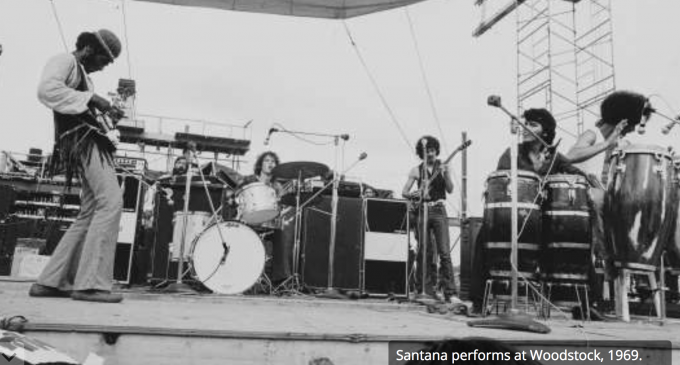Amherst Wire | Woodstock 50: the return of an era?

The iconic three days of peace and music that the Woodstock Festival procured in 1969 are returning for their 50th year anniversary, and festival organizers are attempting to live up to the hype that naturally comes with the title.
Headliners for this year’s festival include The Killers, Miley Cyrus, Chance the Rapper, The Black Keys, Jay-Z and Cage the Elephant. Nine returnees from Woodstock ‘69 are also scheduled to perform, including Santana, Robert Plant of Led Zeppelin and John Fogerty of Creedence Clearwater Revival, as well as members of the Grateful Dead and Canned Heat.
The festival is scheduled for Aug. 16-18 at Watkins Glen, New York, over 150 miles away from its original location in Bethel.
“Typically, I wouldn’t consider attending such a massive festival but I can’t bear the thought of missing the 50th anniversary of something so iconic as Woodstock,” said Brian Morley, a freshman food science major at UMass. “The only thing I don’t like is the third day lineup. Cage the Elephant and The Zombies are the only acts who I’m interested in seeing, but the first two days certainly make up for it.”
Organizers have come under heat for being unable to secure some Woodstock ‘69 performers, most notably The Who. Lead singer Robert Daltrey told Billboard, “You can’t redo Woodstock because the stars of Woodstock were the audience. You can celebrate the date, but you can’t redo (the festival)…I really wouldn’t be interested in something like that.”
The organizers also missed out on icons such as Elton John, Paul McCartney, Ringo Starr, Fleetwood Mac and The Rolling Stones, all of who have toured recently or are currently on tour. Many modern rock acts that could have revived some of the Woodstock ‘69 sentiment also were not booked, including the Red Hot Chili Peppers, Pearl Jam and The Strokes.
The festival faces monolithic expectations, having to live up to the event that helped define music festivals as we know them today. With an ever-evolving world of music, the reincarnation of Woodstock may struggle to attract an audience as massive and iconic as the 400,000 that attended the festival in 1969.
At the time of the festival, rap music was nonexistent, EDM was impossible and rock and roll ruled the radio – a stark contrast to the modern claims that “rock is dead.”
Today, rap and electronic-based music dominate the mainstream. This may cause problems for organizers as they attempt to recreate the original Woodstock vibe, which (obviously) did not include any rap or EDM. The lineup, in an attempt to please everyone, includes music from many different genres. However, the musical climate is more polarized than ever, with there being very little overlap between fans of opposite genres like trap and indie music.
Part of the reason for Woodstock’s initial success was the novelty behind it. As a festival that catered to the youth and promised three days of carefree peace and love in the middle of a field, Woodstock was the first of its kind.
Since its occurrence, dozens of festivals have attempted to recreate what Woodstock did, including Bonnaroo, Lollapalooza and Coachella. Every year, each festival offers a variety of music, appealing to a specific subset of musical tastes. This has caused attendance at individual festivals to plateau, making it seemingly impossible to attract the 400,000 that Woodstock ‘69 did.
However, Woodstock 50 is happening at a special time similar to that of its predecessor that could boost attendance. Woodstock ‘69 occurred at a critical time in American history where the youth felt empowered, emboldened and rebellious.
This spirit seems to be seeing a revival as young people increasingly become involved in politics and activism. In a time of discontent with the government, the youth will find a way to revolt, whether that be by demanding policy changes or creating a festival based on rebellion.
The biggest concern for Woodstock 50 is avoiding the destruction that occurred at the lesser-known Woodstocks of 1994 and 1999. Both festivals drew crowds rivaling those of the original Woodstock, but festival organizers were unable to appropriately control the crowds. Violence broke out with people fighting and lighting fires, and the fields were left in ruins.
Regardless of the past controversy with recreating Woodstock’s image, Woodstock 50 is guaranteed to be an interesting experiment. By combining top modern acts from multiple genres with original Woodstock artists, the festival’s appeal is wide. What will happen this year is unpredictable, but it will be entertaining to see if it recreates past destruction or ushers in a new era of festivals.
March 27, 2019
Follow Matt on Twitter @MattBerg33.




There are no comments at the moment, do you want to add one?
Write a comment